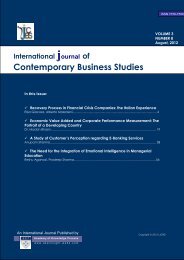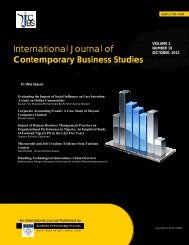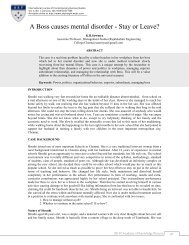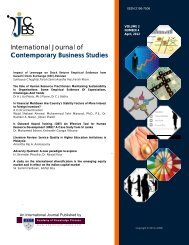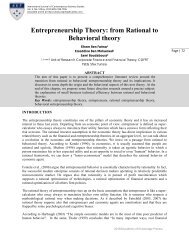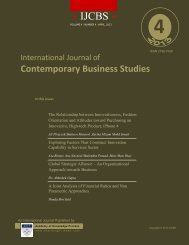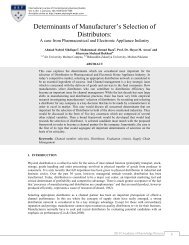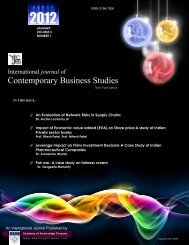International Journal <strong>of</strong> <strong>Contemporary</strong> <strong>Business</strong> <strong>Studies</strong>Vol: 4, No: 2. February, 2013 ISSN 2156-7506Available online at http://www.akpinsight.webs.comMampatta, S.P. and Shrivastava, N. (2010), “Companies shied away from creative accounting afterSatyamgate,” January 6, Money-DNA, Mumbai. Available at www.dnaindia.co.National Fraud Authority (2012), “Annual Fraud Indicator,” March. Available atwww.home<strong>of</strong>fice.gov.uk.National Crime Records Bureau (2012), “Crime in India” June.Norton’s (2011), “Cybercrime Report 2011,” available at www. symantec.com.O’Connell, B., Webb, L, and Schwarzbach, H.R. (2005), “Batten the Hatches! US Accounting Scandalsand Lessons for Australia,” Australian Accounting Review, Vol. 15, no. 2, pp. 52-67.Orumwense, J. (2013), “Implementing the Use <strong>of</strong> Auditing Skills to Identify and Avert Situations WhichCould Lead to Frauds Being Perpetrated,” International Journal <strong>of</strong> Finance and Accounting, Vol.2, no. 1, pp. 19-23.Ozkul, F.U. and Pamukcu, A. (2012), “Fraud Detection and Forensic Accounting,” Emerging Fraud,Springer-Verlag Berlin Heidelberg, Vol. 35, pp. 19-41.Pearson, T.A. and Singleton, T.W. (2008), “Fraud and Forensic Accounting in the Digital Environment,”Issues in Accounting Education, Vol. 23, no. 4, November, pp. 545-559.PwC (2007), The 4 th Biennial Global Economic Crime Survey: India”, PricewaterhouseCoopers Limited.Available at www.pwc.com.Public Company Accounting Oversight Board, 2003. Available at http://www.pcaobus.org.Raj, R. (2010), “BSE’s Top 50 may be worst at Accounting,” <strong>Business</strong> Today, January 21, available atwww.businesstoday.intoday.in.Ramaswamy, V. (2005), “Corporate Governance and the Forensic Accountant,” The CPA Journal, vol.75, no. 3, pp. 68-70.Robinson, S.N. and Robertson, J.C. (2012), “The Effects <strong>of</strong> Contextual and Wrongdoing Attributes onOrganizational Employees’ Whistle-blowing Intentions Following Fraud,” Journal <strong>of</strong> businessethics, vol. 106, issue 2, March, pp. 213-227.Razaee, Z. (2002) “Forensic Accounting Practices, Education and Certification,” Journal <strong>of</strong> ForensicAccounting, Vol. 3, no. 2, pp. 207-223.Razaee, Z., Crumbley, D.L. and Elmore, R.C. (2004), “Forensic Accounting Education: a Survey <strong>of</strong>Academicians and Practitioners,” Advances in Accounting Education Teaching and CurriculumInnovations, Vol. 6, No 2, pp. 193-231.Rezaee, Z, Crumbley, I.D. and Elmore R.C. (2006), “Forensic Accounting Education; A survey <strong>of</strong>Academicians and Practitioners,” Journal <strong>of</strong> Forensic Accounting, Vol.10, No.3, pp, 48 – 59.Rezaee, Z. and Kedia, B.L. (2012), “Role <strong>of</strong> Corporate Governance Participants in Preventing andDetecting Financial Statement Fraud,” Journal <strong>of</strong> Forensic & Investigative Accounting, Vol. 4,no. 2, pp. 176-205.Sanchez and Trewin (2004), “A Forensic Accountant as an Expert Witness in a Criminal Prosecution,”Journal <strong>of</strong> Forensic Accounting, Vol. 5, Issue 1, pp. 231-235.Statement on Auditing Standards No. 99 (2002), “Consideration <strong>of</strong> Fraud in a Financial Statement Audit,”Auditing Standards Board <strong>of</strong> the AICPA, October.Singleton, T.W. and Singleton, A.J. (2010), “Fraud Auditing and Forensic Accounting,” 4 th edition, JohnWiley & Sons Inc., New Jersey.Sugahara, S., and Coman, R. (2010), “Perceived Importance <strong>of</strong> CPA’s General Skills: a Japanese Study,”Asian Journal <strong>of</strong> Finance & Accounting, Vol. 2, no. 1, pp. 1-24.Wells, J.T. (2011), “Principles <strong>of</strong> Fraud Examination,” 3 rd edition, John Wiley & Sons Ltd. USA.World Trademark Review (2012), “Fighting the Crime <strong>of</strong> the 21 st century,” 2012, April/May, pp. 82-83.Available at www.WorldTrademarkReview.com.Zysman, A. (2008), “Forensic Accounting Demystified, World investigators network Standard Practice forinvestigative and forensic accounting engagement?”, Canadian Institute <strong>of</strong> CharteredAccountants, Journal <strong>of</strong> Forensic Accounting. Available at ifa.alliance@cica.ca.2013©<strong>Academy</strong> <strong>of</strong> <strong>Knowledge</strong> <strong>Process</strong>86
International Journal <strong>of</strong> <strong>Contemporary</strong> <strong>Business</strong> <strong>Studies</strong>Vol: 4, No: 2. February, 2013 ISSN 2156-7506Available online at http://www.akpinsight.webs.comNational Culture as a Moderator betweenInternational Diversification Strategy andPerformanceFarooq Ahmed JamPhD(Scholar) in Management, International Islamic University, IslamabadImran SaeedPhD(Scholar) in Management, International Islamic University, IslamabadAtif UllahPhD (Scholar) in Management, Qurutaba University, PeshawarMuhammad ArifLecturer in IBMS, UOA, PeshawarHina GulLecturer in IBMS, UOA, PeshawarPakistanABSTRACTLiterature on International diversification strategy (IDS) and performance has beenreviewed to support their established link .Also literature on national culture dimensionsand its impact on international diversification performance has be reviewed to find astrong support for placement national culture dimension(NCD) as a moderator betweenIDS and firm performance. We gave our propositions placing NCD as moderator andgiven a hypothetical model <strong>of</strong> international diversification that divides the world intothree diversification zones .Model talks about the similar cultural characteristics for allcountries within the zone and different cultural characteristics countries between zones.This cultural fit in a same diversification zone tend to decrease integration cost and henceenhance the firm performance in case <strong>of</strong> international diversification. Our model supportsthe moderation effect <strong>of</strong> national culture in IDS and performance. Future researchimplications are given.INTRODUCTIONLarge renowned scholars in the field <strong>of</strong> internationalization claim that by neglecting the costs <strong>of</strong>internationalizations inquires would explain vague results. (Gomes and Ramaswamy 1999; Hitt,Hoskisson and Kim, 1997).The studies conducted in 1980’s start discussing the benefits as well as costs<strong>of</strong> international strategies. Which include international diversification, merger and acquisition decisions.In early 1990’s both benefits costs and mutual affect was discussed by the researchers. Costs <strong>of</strong>diversification include the costs associated post diversification integration which determines the successor failure <strong>of</strong> the diversification decision and performance <strong>of</strong> firm is directly linked with that integrationcosts.That cost increases as there is a cultural mismatch between the firms diversifying. When national culture<strong>of</strong> a parent and subsidiary company is different that will increase the integration costs for firms due tocultural shock and resistance to adaptability with the firms <strong>of</strong> different national culture. Same like thatwhen there is a cultural fit in a sense that both parent and subsidiary firms have same national culture thatwill tend to decrease the costs associated with integration and hence is the cause for enhanced firmperformance in case <strong>of</strong> international diversification. This idea motivated us to study the internationaldiversification strategy literature, placing performance as dependant variable in the study. We2013©<strong>Academy</strong> <strong>of</strong> <strong>Knowledge</strong> <strong>Process</strong>87



